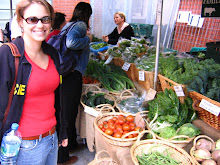 Monica has terrific friends in Lisbon. Monica and I met in Norway in 2004 at the European Society of Rural Sociologists Annual meeting. I’m not a rural sociologist, but this conference rocks, and that’s good enough reason for me to go. Lots of geographers moonlight as rural sociologists in Europe because rural geography is relatively undeveloped in the United States. The conference is structured around 4 days of meetings and presentations on a theme (such as organic agriculture) and one day of tours in between on Wednesday. Did I mention that the (interactive) tour almost always revolves around food or drink?
Monica has terrific friends in Lisbon. Monica and I met in Norway in 2004 at the European Society of Rural Sociologists Annual meeting. I’m not a rural sociologist, but this conference rocks, and that’s good enough reason for me to go. Lots of geographers moonlight as rural sociologists in Europe because rural geography is relatively undeveloped in the United States. The conference is structured around 4 days of meetings and presentations on a theme (such as organic agriculture) and one day of tours in between on Wednesday. Did I mention that the (interactive) tour almost always revolves around food or drink? The Norwegian holiday included a tour of the mountains and maybe some other stuff, but all I remember was a traditional rural Norwegian feast. The table groaned with moose, reindeer, sausages of all kinds, fish, potatoes, fish, cream soups, klub, flatbreads, cheeses… No calories here. After the meal it looked like there had been a mass suicide of rural sociologists on the front lawn. All we could do was lay down and groan over our full stomachs in the long shadows of a high latitude afternoon. I don’t think Monica was on that tour, but I do remember she asked a great question in one of the sessions and I thought she was super smart.
We met again in Kesthezy, Hungary in 2005 at another one of these conferences. This time we spent the whole week together and even shared the same tour of some of Hungary’s thermal baths. Yes. If you have not been to Eastern Europe/Balkans, run don’t walk, to make a booking for a holiday there. There are hundreds of smartly outfitted resorts specializing in mineral springs, most of them hot. The springs, I mean. After enduring literally hours of government officials introducing themselves and explaining the relevance of thermal baths to rural development, we finally were free to take a sample ourselves. (BTW, the Hungarians specialize in anticipation—we waited for hours through speeches for the conference banquet as well. I think this also explains the high incidence of public making out in Budapest…lots of buildup to the main event seems to be quintessentially Hungarian). Anyway…the baths were incredibly rejuvenating and relaxing and Monica and I became friends.
We’ve kept up mostly be email in the intervening 4 years since her visit to the US during the last World Cup, and she has been insisting that I visit her now that she’s back in Portugal working for the Institute of Social Sciences (ICS). At ICS, she has some really amazing colleagues, one of whom is Joana, who is doing a PhD in climate change adaptation. She hosted a dinner party for her friends, including Monica, while I was in Lisbon, and so I tagged along. It was probably the most documented meal in the history of eating. Three of Joana’s guests work for a private company producing documentaries, and they put the camera on us while we ate. They were interested in generating some ideas about a documentary about ethical consumption, and they were interested in what a group of intellectuals (some of whom are foodies) might have to say about food. I also took pictures of everything, took notes about everything and generally conducted research during dinner.
Monica and I had been having a lot of conversations about “typical” Portuguese cuisine. It’s easy to assume that maybe there is some indigenous way of cooking that still exists in Europe, given it’s rich food culture. But, like everything, everywhere, global influences have taken hold. Joana served hummus and olives as appetizers, tabouli as a first course, meat loaf as a main course and chocolate lava cake for dessert. Most of this has roots in Middle-Eastern cuisines that Portugal has borrowed from, but it has also become a part of global cuisines as well. The only “typical” Portuguese dish (i.e., a dish not eaten outside of Portugal) was salt cod and chickpeas—also a first course. Cod is a very common food in Portugal, and I ate it twice during my four day stay in Lisbon. This dish is also heavily influenced by the Arabic culture in the region from the influence of the Islamic empire. Literally translated, chick peas in Portuguese means “beans with a beak”. The name chick peas also refers to the shape of the garbanzo bean which looks like the head of a chick. Cod fish and chickpeas also has onions, boiled eggs and olive oil. A simple, delicious dish.
We didn’t talk too much about food ethics, but we did spend a lot of time talking about carbon markets and mitigation vs adaptation to climate change. It was a stimulating evening with a lot of lovely warmth and affection (I’ll miss being in a place where people kiss each other upon greeting—even strangers. But namaste isn’t so bad). I felt really lucky to have been a part of this dinner party and to have met such smart people. Joana is a passionate, outspoken woman with a side-splitting sense of humor. I look forward to knowing her for a good long time.



No comments:
Post a Comment